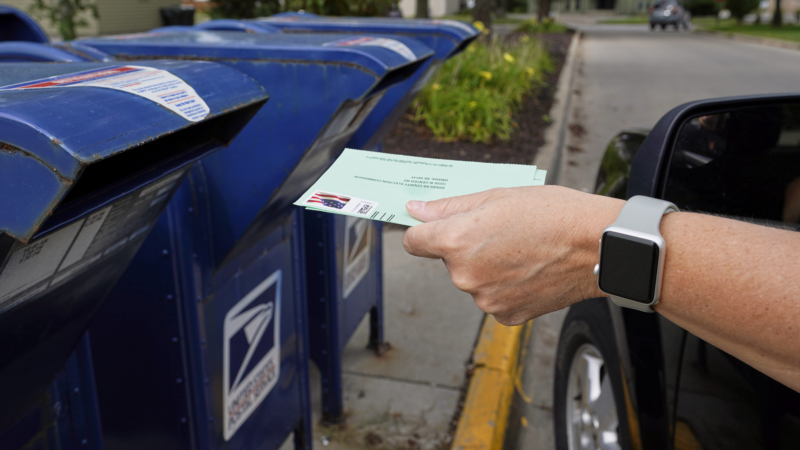Shein and Temu face a big change to how they ship cheap Chinese goods
Shein and Temu, the ultra-cheap, ultra-fast retail giants, could be facing a new reality under rules proposed by the White House on Friday.
These companies have become huge sellers of clothes and home goods shipped from China to the U.S. And both online retailers have been operating differently from most other big retailers, using a tax loophole that’s saved them millions of dollars on import fees.
Instead of bringing large shipments into U.S. warehouses in bulk, Shein and Temu ship small individual orders directly to American shoppers. That means those packages can legally skip import taxes because U.S. law exempts shipments under $800 from import tax.
The Biden administration moved Friday to close that loophole for products that face tariffs, including the majority of clothes and textiles shipped from China.
The volume of these direct-to-consumer shipments that use the import-tax loophole — called “de minimis” — has ballooned. Last year, more than 1 billion packages were shipped to the U.S. compared to 140 million a decade ago, according to White House officials. They did not name Shein and Temu directly, but the shipments from both have accounted for much of the increase.
The White House says this scale of products going through the loophole undercuts American workers, retailers and manufacturers, while also making it harder for government officials to ensure the contents are legal and follow all the health, safety, intellectual-property and consumer-protection rules.
Another problem is fentanyl. This week, 126 Democratic lawmakers called on President Biden to use executive authority and close the import-tax exemption. They say the loophole allows foreign importers to not only evade tariffs, but also ship narcotics and drug-processing equipment without stricter customs inspections.
The White House has proposed rules to stop the exemption from applying to goods that face certain tariffs or trade enforcement actions. Another proposed rule would also demand more paperwork and data on each package seeking the exemption, including certificates of compliance submitted to the Consumer Product Safety Commission.
Both Shein and Temu said Friday that the import loophole was not central to their success.
With clothes and home décor that cost as little as $15 or even $5, Temu and Shein have lured American shoppers to become among the fastest-growing retailers in the U.S.
Their websites post tens of thousands new products every day; they typically don’t go into production until enough people click to buy. Most purchases ship straight from the manufacturer to the shopper’s doorstep.
“Our mission has been to offer consumers a wider selection of quality products at affordable prices,” a Temu spokesperson said in a statement. “We achieve this through an efficient business model that cuts out unnecessary middlemen, allowing us to pass savings directly to our customers. Temu’s growth does not depend on the de minimis policy.”
Temu’s operations are based in China, where it’s faced allegations of using forced labor. Shein is headquartered in Singapore; its executives had told NPR that some of the company’s manufacturers — numbering around 5,000 — are also based in Brazil and Turkey, even though most remain in China.
Shein’s executive chairman had previously spoken in support of a total reform for the de minimis rule, without advocating a specific approach.
“Shein makes import compliance a top priority,” a Shein spokesperson said in a statement. “Our success is anchored in our unique on-demand business model, which allows us to bring customers the styles they want, efficiently and at an affordable price.”
The timeline for the White House’s new proposed rules is unclear. The administration also called on Congress to do a comprehensive reform of the de minimis trade exemption, which lawmakers have long had in their sights.
The original purpose of the exemption was to protect individual shippers and small businesses, and many shipping companies have opposed changes to the import tax structure.
2 former migrant farmworkers reflect on their journey together
Emma and Rogelio Torres reminisce about how unlikely a pairing they were when they first met as migrant farmworkers in Arizona. They met in the 80s near Yuma — with love the last thing on their minds.
Deadly high blood pressure during pregnancy is on the rise
More pregnant women are being diagnosed with dangerously high blood pressure, which risks the life of the parent and child. Montana is one of the states improving screening and treatment.
Voters are advised to return their ballots early because of mail delay concerns
Election officials are raising concerns about the U.S. Postal Service's ability to handle this fall’s expected influx of election mail. But USPS say it’s ready to deliver the country’s ballots.
Turkey wants to regulate Germany’s beloved döner kebab street food
Under Turkey's proposal, beef would be required to come from cattle that is at least 16 months old, and be marinated with specific amounts of fat, yogurt or milk, onion, salt, thyme, and pepper.
An iconic Churchill photo stolen in Canada and found in Italy is ready to return
Canadian and Italian dignitaries marked the successful recovery of a portrait of Winston Churchill known as "The Roaring Lion," stolen in Canada and recovered in Italy after a two-year search.
Shohei Ohtani becomes the first MLB player to top 50 homers and 50 steals in a season
The Los Angeles Dodgers star reached the 50-50 milestone in his 150th game. He was already the sixth player in MLB history and the fastest ever to reach 40 home runs and 40 stolen bases in a season.





